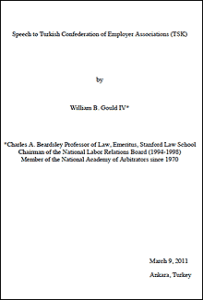William B. Gould: Speech to Turkish Confederation of Employer Associations about U.S. Labor Arbitration & Dispute Resolution

ANKARA, Turkey, March 9, 2011—William B. Gould, Stanford Law professor emeritus, delivered a speech to the Turkish Confederation of Employer Associations on arbitration and the system of labor dispute resolution in the United States. In addition to being the former chairman of the National Labor Relations Board (1994-1998), Gould has been a member of the National Academy of Arbitrators since 1970.
Some highlights of his speech:
As many of you probably know, the American system of labor management relations is not susceptible to easy generalization. Over the past half century trade unions have declined precipitously in the United States, constituting between 11-12% of the workforce and slightly under 7% in the private sector. If unions in the public sector had not grown so rapidly in the ‘60s, ‘70s and ‘80s, the decline would be even more considerable.
American unions were principally craft or occupational unions until the Great Depression when industrial unions covering entire industries, representing and brokering the competing interests of the skilled, semi-skilled and unskilled in one “appropriate unit” became more important. Nonetheless, the system is decentralized with most collective bargaining and representation of employees at plant level …
Whatever the failings of the American system – and they are considerable – its main strength lies in arbitration and the system of dispute resolution which has emerged in the United States.
…
When I was Chairman of the National Labor Relations Board we introduced the concept of settlement judges amongst our administrative law judges who go into the field and hold trials. The Board explicitly gave such judges the authority to mediate unfair labor practice disputes where we or the chief administrative law judge was of the view that there was a potential for negotiation and compromise. If the mediatory process was unsuccessful, we selected a new administrative law judge so as to avoid the problems outlined above.
In the “mother of all strikes” involving baseball in 1994-95 the NLRB intervention in federal court before Judge Sonia Sotomayor (President Obama has since named her to the Supreme Court) created an environment in which collective bargaining was promoted and, subsequent to the 1996 labor contract, the parties have enjoyed 16 years of peace and prosperity in a $7 billion industry – all of us are hoping that the National Football League will be able to go and do likewise in their rich $9 billion industry!
…
Thus far the focus has been upon relationships between unions and employers. But let us not forget that in the United States, in what the Europeans have referred to as a weak and less muscular version of labor-management relations we have witnessed the above-mentioned decline in trade union representation. Now, as you may have read, a number of Republican governors have initiated an assault, to use the parlance of President Obama, against collective bargaining in the public sector in Midwestern states like Wisconsin, Ohio, Indiana and Iowa and the full result of which is not yet clear.
There is an attempt to eliminate collective bargaining all together now in Wisconsin. In Ohio “[m]ost significant for local workers like police officers and fire fighters was the change that would give elected officials the power to decide labor impasses, something that is currently handled by neutral third parties … ” The proponents of attack upon both public employee unions and arbitration have run into some unexpected resistance. Perhaps most important in this debate are the outsized so-called fringe benefits in the pension and health care arena in the public sector.
…
Read the full speech here.
